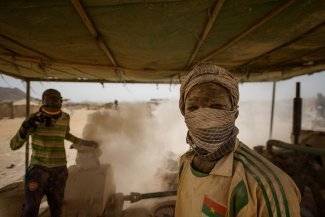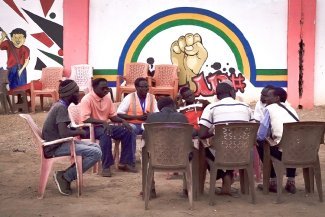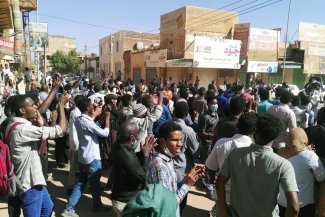Sudanese army chief Abdelfatah al-Burhan (centre) visits a military base in the coastal city of Port Sudan on 28 August 2023.
Violence has been a structurally defining feature of Sudan almost ever since its creation in 1956. Today, the result of this violence, with the outbreak of the latest conflict on 15 April, is thousands more dead and wounded, 1.3 million refugees (mainly in Chad), more than 5 million people forcibly displaced and 25 million dependent on humanitarian aid to survive (out of a total population of 45.6 million). And despite the brutal scale of the tragedy, which places Sudan at the heart of the world’s largest humanitarian crisis, it still receives such limited international attention. It should therefore come as no surprise that, in response to the demand made on 16 November by the authorities in Khartoum, the UN Security Council passed a resolution (with only Russia abstaining) putting an end (as of 3 December) to the United Nations Integrated Transition Assistance Mission in Sudan (UNITAMS).
The UN mission began in 2020, a year after the fall of dictator Omar al-Bashir, with the aim of supporting the transition to democracy. It was not long before Abdelfatah al-Burhan staged a coup, in October of the same year, taking advantage of his position as head of the armed forces, and coincided with the end of the United Nations-African Union Hybrid Operation in Darfur (UNAMID). This peacekeeping force confined to Darfur, with some 20,000 troops deployed on the ground, gave way to a political mission with barely 250 troops and a mandate to operate throughout the country.
The same downward trend has also been observed in the humanitarian field, so much so that the recent UN appeal to meet the basic needs of 18.1 million people has barely raised a third of the US$2.6 billion requested.
Going back to the beginnings, it was the British, seeking to serve their own interests, that ignited the spark by creating what was, for long, the largest country in Africa, and forcing those who had no desire to do so to live together. This structural flaw has since been compounded by other factors that the almost 30 years of Omar al-Bashir’s dictatorship only managed to paper over, painting a picture of false stability, punctuated by violence and repression, with particularly tragic episodes such as that still affecting Darfur, followed by South Sudan’s independence (in 2011). The overthrow of the dictator in April 2019 brought no more than a brief glimmer of hope, with the Forces for Freedom and Change spearheading a civilian transition to democracy that the military radically overturned in 2021. This same military is now fighting amongst itself, fuelled by a predatory ambition that is impervious to the suffering of the vast majority of the population.
On one side is General Abdelfatah al-Burhan, head of the Sudanese Armed Forces (SAF), the main protagonist in the overthrow of al-Bashir, having led the coup, and currently the country’s supreme leader, as the head of the Sovereign Council. On the other side is General Mohamed Hamdan Dagalo, better known as Hemedti, head of the now declared rebel Rapid Support Forces (RSF) and second-in-command of the Sovereign Council. Both were clearly aligned with al-Bashir during the dictatorship, and implicated in the atrocities committed over the years in Darfur (neither has been formally summoned by the International Criminal Court, unlike the dictator), and neither stands out for their democratic zeal.
More than a power struggle between generals?
Although both want to paint it differently, their current confrontation is not over ideological differences of any kind. On first reading, the conflict could be construed as the result of two generals’ divergent views on two key issues on the national agenda: 1) a prospective agreement with civilian actors to put the political process back on track, implementing what was agreed in November 2021 to launch a new transitional period headed by a civilian government; and 2) the process of integrating the RSF within the SAF, putting an end to the existence of an independent paramilitary force, born out of the very violent Janjaweed militias promoted by al-Bashir himself to repress the revolt in Darfur, now reluctant to submit to Khartoum’s authority. But, ultimately, everything seems to point to this being a straightforward power struggle between the two figures.
Further complicating this domestic conflict are the many neighbours and external powers keen to sway what happens there.
One example is Egypt, led by a fellow coup leader, Abdel Fatah al-Sisi, and its clear attempt to preserve the historic influence it has exercised over its neighbour to the south, both to ensure the stability of its southern border and to gain an ally in its efforts to protect its interests against the adverse effects of the Grand Renaissance Dam that Ethiopia is determined to keep building. Its preference for al-Burhan seems clear, but he is also endeavouring to maintain relations with Hemedti.
Hemedti, for his part, not only has his own armed force of around 100,000 troops that are very well equipped thanks to his own personal fortune and his control of gold mines and powerful smuggling networks, but he also enjoys support from key external actors such as the United Arab Emirates and Saudi Arabia. Hemedti has, after all, been involved in the Yemen war, contributing fighters to the forces of Abu Dhabi and Riyadh, and this has earned him considerable financial and political backing, which he now seeks to use to his advantage.
Russia, meanwhile, is also very active, increasingly positioning itself in Hemedti’s favour, and even providing mercenaries from the Wagner group (although Moscow has denied this). Moscow has long shown a clear desire to establish a naval base in Port Sudan, hence its growing interest in the country. It has nonetheless continued to maintain a direct dialogue with al-Burhan.
Finally, focused on its energy security, China’s greatest interest in Sudan remains its oil (although its ownership is yet to be defined, pending a final border agreement between Khartoum and Juba). So it is calling for restraint on both sides, stability being China’s main objective. The European Union and the United States are taking the same line, although their constant insistence on containment and stability is not incompatible with the acceptance of a military-controlled government, as has in fact been the case since the end of the al-Bashir dictatorship.
In short, there is no indication that, in the fight for the spoils, either of the two generals is willing to budge, at least until they see what their loyal troops can do with weapons in hand. Adding to the gloomy outlook, the mediators in the peace negotiations (Saudi Arabia, the US and the Intergovernmental Authority on Development) that began last October have decided to suspend the talks indefinitely, in view of both sides’ complete unwillingness to adjust their positions.













